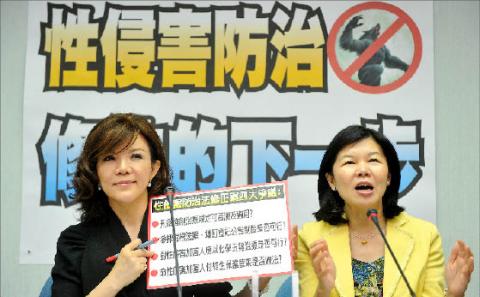The chemical castration of repeat sex offenders is a form of therapy, not a punishment, and it does not need to be written into law, a Chinese Nationalist Party (KMT) lawmaker said yesterday.
KMT Legislator Pan Wei-kang (潘維剛) said that in a number of public hearings organized to discuss amendments to the Sexual Assault Crime Prevention Act (性侵害犯罪防治法), a majority of specialists and academics agreed that the chemical castration of repeat sex offenders should be considered therapeutic intervention. If that definition receives broad public acceptance it would not be necessary to insert a new clause into the law to authorize its use in specific cases, Pan said.
Echoing Pan’s views, Food and Drug Administration Deputy Director Wang Tsung-hsi (王宗曦) said chemical castration is purely a medical matter. Since chemical castration is not part of the penalty regime for offenders there was no need to amend the law to implement it, he said.

Photo: Chien Jung-fong, Taipei Times
However, Ministry of Justice Chief Secretary Tsai Ching-hsiang (蔡清祥) said the Criminal Law would have to be amended in order to carry out the chemical castration of sex offenders.
If chemical castration is to be used as a form of punishment, the penal code must first be amended, Tsai said.
According to Pan, legislators from across party lines have agreed to prioritize the screening of revisions to the Sexual Assault Crime Prevention Act.
“The KMT will see to it that the amendments are passed in the next legislative session,” Pan said.
The issue of chemical castration was raised in March after a repeat sex offender allegedly raped and murdered a teenage girl shortly after his release from prison. The man was released in February and was scheduled for his first rehabilitation counseling session on April 1.

Chinese Nationalist Party (KMT) Chairman Eric Chu (朱立倫), spokeswoman Yang Chih-yu (楊智伃) and Legislator Hsieh Lung-chieh (謝龍介) would be summoned by police for questioning for leading an illegal assembly on Thursday evening last week, Minister of the Interior Liu Shyh-fang (劉世芳) said today. The three KMT officials led an assembly outside the Taipei City Prosecutors’ Office, a restricted area where public assembly is not allowed, protesting the questioning of several KMT staff and searches of KMT headquarters and offices in a recall petition forgery case. Chu, Yang and Hsieh are all suspected of contravening the Assembly and Parade Act (集會遊行法) by holding

PRAISE: Japanese visitor Takashi Kubota said the Taiwanese temple architecture images showcased in the AI Art Gallery were the most impressive displays he saw Taiwan does not have an official pavilion at the World Expo in Osaka, Japan, because of its diplomatic predicament, but the government-backed Tech World pavilion is drawing interest with its unique recreations of works by Taiwanese artists. The pavilion features an artificial intelligence (AI)-based art gallery showcasing works of famous Taiwanese artists from the Japanese colonial period using innovative technologies. Among its main simulated displays are Eastern gouache paintings by Chen Chin (陳進), Lin Yu-shan (林玉山) and Kuo Hsueh-hu (郭雪湖), who were the three young Taiwanese painters selected for the East Asian Painting exhibition in 1927. Gouache is a water-based

Taiwan would welcome the return of Honduras as a diplomatic ally if its next president decides to make such a move, Minister of Foreign Affairs Lin Chia-lung (林佳龍) said yesterday. “Of course, we would welcome Honduras if they want to restore diplomatic ties with Taiwan after their elections,” Lin said at a meeting of the legislature’s Foreign Affairs and National Defense Committee, when asked to comment on statements made by two of the three Honduran presidential candidates during the presidential campaign in the Central American country. Taiwan is paying close attention to the region as a whole in the wake of a

OFF-TARGET: More than 30,000 participants were expected to take part in the Games next month, but only 6,550 foreign and 19,400 Taiwanese athletes have registered Taipei city councilors yesterday blasted the organizers of next month’s World Masters Games over sudden timetable and venue changes, which they said have caused thousands of participants to back out of the international sporting event, among other organizational issues. They also cited visa delays and political interference by China as reasons many foreign athletes are requesting refunds for the event, to be held from May 17 to 30. Jointly organized by the Taipei and New Taipei City governments, the games have been rocked by numerous controversies since preparations began in 2020. Taipei City Councilor Lin Yen-feng (林延鳳) said yesterday that new measures by